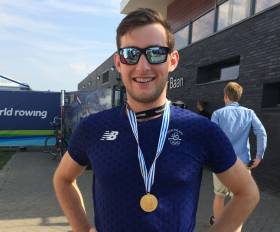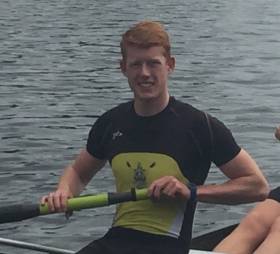Displaying items by tag: Shane O'Driscoll
O'Donovan is World Rowing Champion (VIDEO)
#Rowing: Ireland's Paul O'Donovan is the new champion of the world in the lightweight single sculls. The UCD clubman won the A Final in Rotterdam by clear water from Peter Galambos of Hungary in difficult, windy, conditions.
O'Donovan was sixth at the 500 metre mark, but was already moving. He simply outclassed the field from there. Rajko Hrvat of Slovenia valiantly tried to match him, but repeated pushes by Skibbereen's finest left him behind. O'Donovan then drove on to win. The crowds rose to the new star of world rowing.
Ireland Oarsmen the Afloat Rowers of the Month
#Rowing: The Rowers of the Month for July are Mark O’Donovan and Shane O’Driscoll of Skibbereen. The Irish Championships offered a list of great performances: the Commerical senior eight won a thrilling final; the Cork Boat Club junior pair of Amy Mason and Tara Hanlon impressed and would go on the take silver at the Coupe de la Jeunesse; the rising star that is Daire Lynch took three titles. However, O’Donovan and O’Driscoll had the outstanding run, taking five titles: together they won the senior pair and senior double, while O’Donovan won the senior single sculls and O’Driscoll the lightweight single. They also teamed up with Fintan McCarthy and Kenny McCarthy to win the senior quadruple. The combined efforts of all the Skibbereen crews brought them 13 titles, lifting the west Cork club to 163 in total, clear at the top of the rankings as the most successful Irish club.
Mark O’Donovan and Shane O’Driscoll will represent Ireland in the lightweight pair at the World Championships in Rotterdam in late August.
Rower of the Month awards: The judging panel is made up of Liam Gorman, rowing correspondent of The Irish Times, and David O'Brien, editor of Afloat magazine. Monthly awards for achievements during the year will appear on afloat.ie and the overall national award will be presented to the person or crew who, in the judges' opinion, achieved the most notable results in, or made the most significant contribution to rowing during 2016. Keep a monthly eye on progress and watch our 2016 champions list grow.
#Rowing: Skibbereen brought their tally of titles for the Irish Rowing Championships to a remarkable 10 so far as Denise Walsh and Shane O'Driscoll had big wins in the lightweight single sculls in the morning session of the third day.
Shandon's win in the men's junior double was a sweet one for Stephen O'Sullivan and Ronan Byrne. They led Clonmel all down the course and held off push after push in the final 500 metres. Strokeman O'Sullivan shouted with joy at the finish, but it was a particularly big win for Byrne. He had been beaten by the Clonmel strokeman, Daire Lynch, in the junior single. Byrne and Lynch team up in the Ireland junior double for the World Championships.
Cork Boat Club's good run in junior events continued, as Amy Mason and Tara Hanlon won the junior pair. Portora won the men's intermediate pair and NUIG the club coxed four. Commercial led all the way in the women's intermediate four and had a clearwater margin at the finish.
Irish Rowing Championships, National Rowing Centre, Day Three (Selected Results, Finals)
Men
Four - Club, coxed: NUIG 6:33.156.
Pair - Inter: Portora 6:49.900.
Sculling, Double - Junior: 1 Shandon A 6:36.777, 2 Clonmel 6:39.324, Castleconnell A 6:51.168.
Lightweight Single: 1 Skibbrereen (S O'Driscoll) 7:15.482, 2 Skibbereen (A Burns) 9:08.433, 3 Carlow (O Nolan) 7:36.764.
Women
Four - Inter, coxed: Commercial 7:20.348.
Pair - Junior: 1 Cork 7:35.640, 2 Bann 7:41.453, 3 Shannon 7:41.750
Sculling - Lightweight Single: Skibbereen (D Walsh) 7:54.535, 2 Carlow (A Byrne) 8:21.130, 3 Queen's (R Brown) 8:33.287.































































